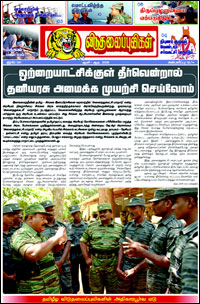 Excerpts from the article follow:
Excerpts from the article follow:
SANGAM.ORG
Ilankai Tamil Sangam, USA, Inc.
Association of Tamils of Sri Lanka in the USA
by TamilNet, July 19, 2006
|
This persistent pattern of APCs demonstrates the Sinhala governments' approach to resolving Sri Lanka’s ethnic struggle. Each time, after stonewalling peace efforts because of its unwillingness to accept the political aspirations of the Tamil people, Sri Lanka calls an APC. In the APC Sri Lanka brings together all the Sinhala parties, postures as being the side dedicated to a peaceful resolution, and proceeds to advance a one-sided resolution within the unitary constitution, a solution which has been repeatedly rejected by the Liberation Tigers. |
The All Party Conference (APC) on constitutional reforms initiated by Sri Lanka’s President Mahinda Rajapakse follows exactly the same political approach to the national question used by previous Sinhala Presidents - Jayawardene, Premadasa, and Chandrika Kumaratunge. The APC is a recurring tactic used by Sri Lanka's presidents to exhibit a peace posture to placate the international community, while at the same time refusing to reconfigure the polity from the rigid and majoritarian Unitary constitution now in existence, said the latest edition of the official periodical of the Liberation Tigers, Viduthalaipulikal, printed in Kilinochchi.
 Excerpts from the article follow:
Excerpts from the article follow:
In the history of Sri Lanka’s ethnic struggle, Sri Lanka’s Presidents of the past have held "All Party Conferences (APC)” as a mechanism to take the edge off the Tamil national struggle. A closer examination of the contexts in which the APCs have been held, reveals a persistent pattern.
In 1984, after refusing to even study the political guidelines put forward by the Tamils at the “Thimpu Talks,” which emphasized the acceptance of Tamil homeland, Tamil nationhood and the Tamil right to self-determination, as pre-requisites for any negotiated solution, the Sinhala government lead by J R Jeyawardene convened an APC. The Sinhala political parties during APC deliberations advanced theories to dress-up the “district councils” proposal within Sri Lanka’s Unitary constitution.
Then in 1994, Chandrika Kumaratunge, when the peace talks failed with the LTTE due to the over confidence of her military, turned to forming an APC. Her proposals based on a Union of Regions got watered down during the APC process and ended up nowhere when hostilities again broke out.
Presently the four and a half years long peace effort has also lost its way. It is in this context that Mahinda Rajapakse is initiating yet another APC.
This persistent pattern of APCs demonstrates the Sinhala governments' approach to resolving Sri Lanka’s ethnic struggle. Each time, after stonewalling peace efforts because of its unwillingness to accept the political aspirations of the Tamil people, Sri Lanka calls an APC. In the APC Sri Lanka brings together all the Sinhala parties, postures as being the side dedicated to a peaceful resolution, and proceeds to advance a one-sided resolution within the unitary constitution, a solution which has been repeatedly rejected by the Liberation Tigers.
The opening address by Mahinda Rajapakse at the latest APC drama reveals his views about the solution to the Tamil struggle. He said that the solution must be found within a unitary system with the consent of the Sinhala people. His speech did not even acknowledge Tamil aspirations. Tamil parliamentary representatives were not invited to participate. Similar to APCs of the past, Mr Rajapakse’s APC has not wavered from taking a hard-line position, promising little change to the traditional Sinhala approach to the Tamil national question.
The current APC also has a hidden objective: to turn Tamil struggle, which has become an international issue, back into an internal issue, and force a one-sided solution within the unitary system. The Government of Sri Lanka aims to use the APC as an excuse to again force a war on the Tamils, when the solution within the unitary system proposed at this APC is rejected by the LTTE.
It will be a futile exercise to attempt to find a resolution after marginalizing the Tamil side to the conflict. The previous attempt by Chandrika's government to find a resolution by marginalizing the LTTE was a dismal failure.
Over the thirty year history of the armed struggle, the LTTE has participated five times in direct talks with the Sinhala government. Each time, the talks failed due to the hard line stance of the Sinhala government and its over confidence of its own military capability. The latest peace effort with Norwegian facilitation, with the CFA signed, has lead to some agreements.
The Sinhala government has not shown any sincere committment to strengthen the peace process through respecting the agreements reached. Calls by the LTTE to fully implement the CFA have been ignored. This has forced the LTTE to lose confidence in the talks.
If Rajapakse's government is genuine about finding a peaceful resolution to the ethnic conflict, it must respect the CFA and show its willingness to hold talks with the LTTE on the basis of the Interim Self Governing Authority (ISGA) proposal submitted by the LTTE.
If the Sri Lankan government rejects this political position of the LTTE, then the LTTE has no alternative except to seek its own path to win political freedom for the Tamil people.
© 1996-2026 Ilankai Tamil Sangam, USA, Inc.